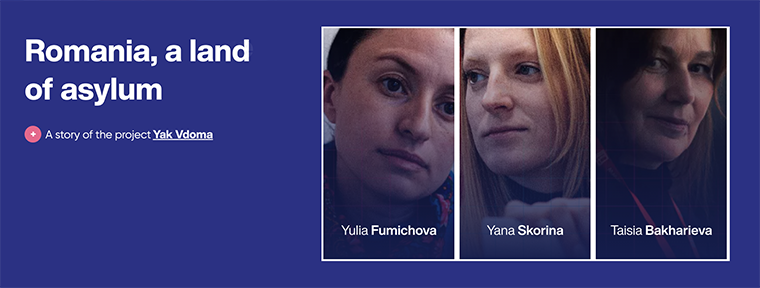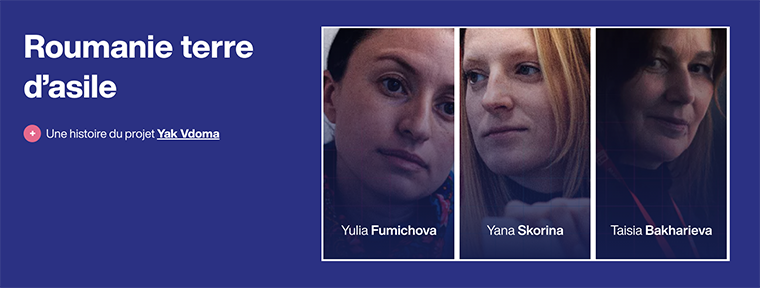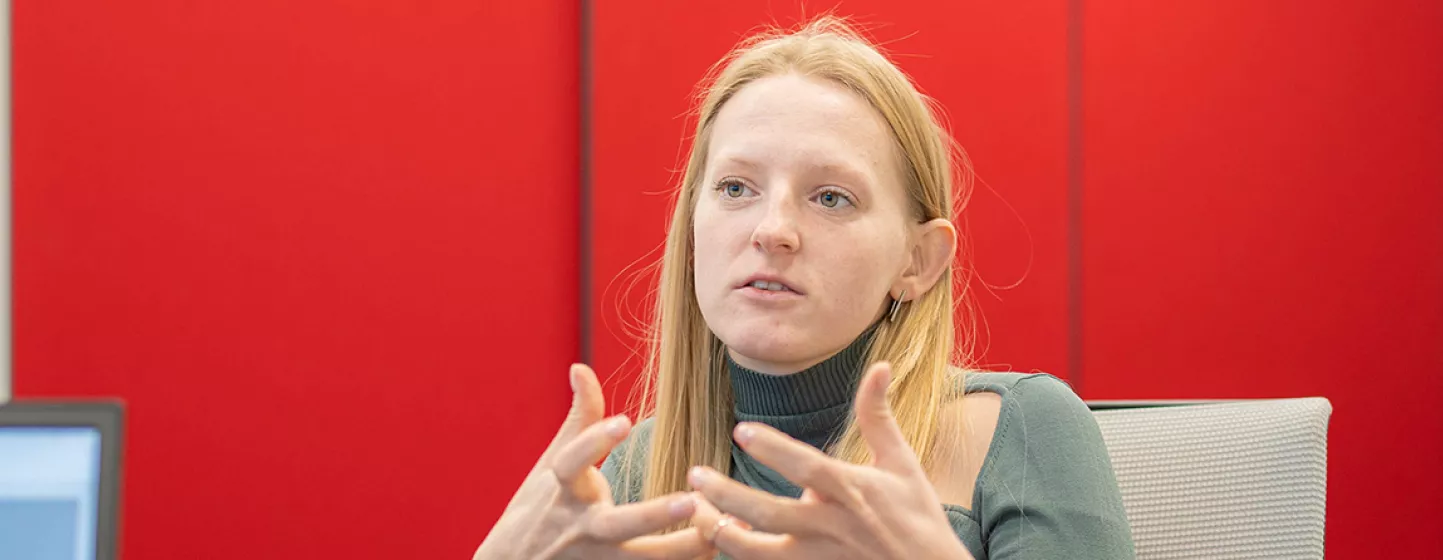Yana Skoryna, the war in Ukraine as seen from Romania
Yana Skoryna is the youngest member of the Yak Vdoma residence in Bucharest, where she seeks to use her experience in television to tell the story of the war and Romanian-Ukrainian cooperation.
Yana remembers arriving in Bucharest last July well. She and her boyfriend had spent the previous five months on the move in a constant state of shock like so many others, unable to think about anything, let alone work. Lithuania, Germany, Croatia and Montenegro, "we just didn't know where to go," recalls the 30-year-old, sporting long, straight blonde hair.
Arms folded with a determined look on her face, Yana talks about the "shock" of their arrival in Romania. Attacked like prey, by an enemy who stops at nothing, she remembers the hard-to-describe feeling of arriving in a place, "where people help you without asking for anything in return; it was a real shock." There is no doubt in her mind, "the way the Ukrainian people have been welcomed and cared for has touched them deeply to their core. Support given from the moment you enter the country, as soon as you get off the train or out of the car. I know a lot of Romanians who give unconditional help, medical aid, shelter, everything they have," she states, admiringly.
Seen from here, a year after the Russian offensive, it seems natural, but at the time the Ukrainians had no idea what to expect. "When you feel like you're being hounded, it's hard to think about the present or the future. The truth is − especially in a foreign country − you can't really concentrate on the basics like food and shelter. Without help, I don't know what would have become of us all," adds the young woman, originally from Petrovske but who had been living in Kiev for several years.
Romania, a window on the Ukrainian conflict
It's hard to believe that Yana was working for an entertainment TV channel just over a year ago. As soon as she arrived in Romania, she started working for Context.ro, a Romanian website that publishes investigations into war and corruption. Then Yak Vdoma suggested that she take things further and make videos. With ten years' experience as a TV journalist, Yana has always been interested in capturing emotion; she talks about the "magic of images." It was the chance for her to get back to what she knows best.
"Yak Vdoma wanted to offer filmed content and invested in equipment, the idea being to interview experts, officials and refugees from Ukraine, and Romanians." The aim was to raise awareness of everything happening in Romania in the context of the war.
The start of bilateral relations between Ukraine and Romania
Yana talks of unprecedented bilateral relations at every level "between two countries that have long turned their backs to each other." Like many Ukrainians, she knew nothing of her Latin neighbour to the south − now providing indispensable support − despite their shared 650km border. All the more so, as she soon realised that, "the Romanians have also had problems with the Russians in the past."
For her, this is an important reason for their unconditional support: "The Romanians know that if they don't help Ukraine, they will be next on the list. Ukraine is like a shield for all the neighbouring states, and people have understood that very well."
Ukraine's defiant behaviour is deemed irrational by some. "I've heard Romanians tell me that they don't understand how we can stand up to Putin without buckling. I always tell them that since the 1990 treaty, it's been clear that Ukraine is an independent country, including the Donbass and Crimea, and that it's normal to fight. It's when you start talking about what you've lost that people here understand why you're fighting, because they draw parallels with Bessarabia, whose loss they still feel sorely," continues Yana, who compares Russian expansion to a cancerous tumour.
But what the journalist wants to capture in her videos today is not so much the fear felt in Romania as what the conflictual relationship between the two nations tells us about what the Romanians do for the Ukrainians, and what the Ukrainians do for the Romanians.
Yana gives us the example of interviews she has conducted for a programme to enable Ukrainians to donate blood for their soldiers at the front, but also to donate for Romanians. An initiative considered particularly useful given that only 1.7% of Romanians donate blood - the lowest figure in the EU. In her words, it's a way of, "paying them back and, above all, preparing a common future for the two neighbouring countries within the EU".

La Roumanie, fenêtre sur le conflit ukrainien
Difficile de croire que Yana travaillait pour une chaîne de télévision de divertissement il y a à peine plus d’un an. Aussitôt arrivée en Roumanie, elle se met à travailler pour Context.ro, un site roumain qui publie des investigations liées à la guerre et à la corruption. Puis Yak Vdoma lui propose d'aller plus loin et de faire de la vidéo. Yana a dix ans d'expérience en tant que journaliste TV et ce qui l'a toujours intéressée, c'est de capter les émotions ; elle parle de « magie de l'image ». Un retour aux sources pour Yana. « Yak Vdoma voulait proposer des contenus filmés et a investi dans des équipements. L'idée c'est de faire des interviews avec des experts, des officiels, des réfugiés d'Ukraine et des Roumains ». Le but, en fil rouge, est de faire connaître tout ce qui se passe en Roumanie dans le contexte de la guerre.
Le début de relations bilatérales entre Ukraine et Roumanie
Yana parle de relations bilatérales inédites, à tous les niveaux, « entre deux pays qui se sont longtemps tournés le dos ». Elle non plus, comme beaucoup d'Ukrainiens, ne savait rien du voisin latin au sud désormais indispensable malgré la frontière commune de 650 km. D'autant, comme elle ne tarde pas à le comprendre rapidement, « que les Roumains ont eu eux aussi des problèmes avec les Russes durant leur histoire ». Pour elle, c'est même une raison importante de ce soutien inconditionnel : « les Roumains savent que si ils n'aident pas l'Ukraine, ils seront les prochains sur la liste. L'Ukraine est comme un bouclier pour tous les États voisins, les gens ont très bien compris cela ». Un bouclier téméraire au comportement presque irrationnel pour certains. « J'ai entendu des Roumains me dire qu'ils ne concevaient pas comment on pouvait résister à Poutine sans céder. Je leur réponds toujours que depuis ce traité de 1990 il est clair que l'Ukraine est un pays indépendant comprenant le Donbass et la Crimée et qu'il est normal de se battre. C'est quand tu commences à parler concrètement de ce que tu as perdu que les gens d'ici comprennent pourquoi tu te bats, car ils font le parallèle avec la Bessarabie dont la perte leur est restée en travers de la gorge », estime Yana, qui compare l'expansion russe à une tumeur cancéreuse.
Mais ce que veut avant tout capter la journaliste dans ses vidéos aujourd'hui, ce n'est pas tant cette peur chez le voisin roumain que ce que raconte le conflit des relations entre les deux pays : ce que font les Roumains pour les Ukrainiens, mais aussi ce que ces derniers font pour les premiers. Yana nous donne l'exemple d'interviews qu'elle réalise, sur un programme visant à ce que les Ukrainien•nes puissent donner leur sang pour leurs soldats au front mais aussi pour les Roumain•es. Une initiative utile alors que seulement 1,7 % de la population roumaine donne son sang – plus bas chiffre de l'UE. Une manière, selon elle, « de rendre la monnaie de leur pièce et surtout de préparer un avenir commun et au sein de l'UE pour les deux pays voisins ».

